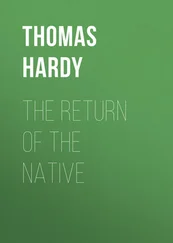He hastened down the lane and round into the straight broad street, which he followed till it merged in the highway, and all sound of his late companions had been left behind. Onward he still went, under the influence of a childlike yearning for the one being in the world to whom it seemed possible to fly—an unreasoning desire, whose ill judgement was not apparent to him now. In the course of an hour, when it was between ten and eleven o'clock, he entered the village of Lumsdon, and reaching the cottage, saw that a light was burning in a downstairs room, which he assumed, rightly as it happened, to be hers.
Jude stepped close to the wall, and tapped with his finger on the pane, saying impatiently, "Sue, Sue!"
She must have recognized his voice, for the light disappeared from the apartment, and in a second or two the door was unlocked and opened, and Sue appeared with a candle in her hand.
"Is it Jude? Yes, it is! My dear, dear cousin, what's the matter?"
"Oh, I am—I couldn't help coming, Sue!" said he, sinking down upon the doorstep. "I am so wicked, Sue—my heart is nearly broken, and I could not bear my life as it was! So I have been drinking, and blaspheming, or next door to it, and saying holy things in disreputable quarters—repeating in idle bravado words which ought never to be uttered but reverently! Oh, do anything with me, Sue—kill me—I don't care! Only don't hate me and despise me like all the rest of the world!"
"You are ill, poor dear! No, I won't despise you; of course I won't! Come in and rest, and let me see what I can do for you. Now lean on me, and don't mind." With one hand holding the candle and the other supporting him, she led him indoors, and placed him in the only easy chair the meagrely furnished house afforded, stretching his feet upon another, and pulling off his boots. Jude, now getting towards his sober senses, could only say, "Dear, dear Sue!" in a voice broken by grief and contrition.
She asked him if he wanted anything to eat, but he shook his head. Then telling him to go to sleep, and that she would come down early in the morning and get him some breakfast, she bade him good-night and ascended the stairs.
Almost immediately he fell into a heavy slumber, and did not wake till dawn. At first he did not know where he was, but by degrees his situation cleared to him, and he beheld it in all the ghastliness of a right mind. She knew the worst of him—the very worst. How could he face her now? She would soon be coming down to see about breakfast, as she had said, and there would he be in all his shame confronting her. He could not bear the thought, and softly drawing on his boots, and taking his hat from the nail on which she had hung it, he slipped noiselessly out of the house.
His fixed idea was to get away to some obscure spot and hide, and perhaps pray; and the only spot which occurred to him was Marygreen. He called at his lodging in Christminster, where he found awaiting him a note of dismissal from his employer; and having packed up he turned his back upon the city that had been such a thorn in his side, and struck southward into Wessex. He had no money left in his pocket, his small savings, deposited at one of the banks in Christminster, having fortunately been left untouched. To get to Marygreen, therefore, his only course was walking; and the distance being nearly twenty miles, he had ample time to complete on the way the sobering process begun in him.
At some hour of the evening he reached Alfredston. Here he pawned his waistcoat, and having gone out of the town a mile or two, slept under a rick that night. At dawn he rose, shook off the hayseeds and stems from his clothes, and started again, breasting the long white road up the hill to the downs, which had been visible to him a long way off, and passing the milestone at the top, whereon he had carved his hopes years ago.
He reached the ancient hamlet while the people were at breakfast. Weary and mud-bespattered, but quite possessed of his ordinary clearness of brain, he sat down by the well, thinking as he did so what a poor Christ he made. Seeing a trough of water near he bathed his face, and went on to the cottage of his great-aunt, whom he found breakfasting in bed, attended by the woman who lived with her.
"What—out o' work?" asked his relative, regarding him through eyes sunken deep, under lids heavy as pot-covers, no other cause for his tumbled appearance suggesting itself to one whose whole life had been a struggle with material things.
"Yes," said Jude heavily. "I think I must have a little rest."
Refreshed by some breakfast, he went up to his old room and lay down in his shirt-sleeves, after the manner of the artizan. He fell asleep for a short while, and when he awoke it was as if he had awakened in hell. It was hell—"the hell of conscious failure," both in ambition and in love. He thought of that previous abyss into which he had fallen before leaving this part of the country; the deepest deep he had supposed it then; but it was not so deep as this. That had been the breaking in of the outer bulwarks of his hope: this was of his second line.
If he had been a woman he must have screamed under the nervous tension which he was now undergoing. But that relief being denied to his virility, he clenched his teeth in misery, bringing lines about his mouth like those in the Laocoön, and corrugations between his brows.
A mournful wind blew through the trees, and sounded in the chimney like the pedal notes of an organ. Each ivy leaf overgrowing the wall of the churchless church-yard hard by, now abandoned, pecked its neighbour smartly, and the vane on the new Victorian-Gothic church in the new spot had already begun to creak. Yet apparently it was not always the outdoor wind that made the deep murmurs; it was a voice. He guessed its origin in a moment or two; the curate was praying with his aunt in the adjoining room. He remembered her speaking of him. Presently the sounds ceased, and a step seemed to cross the landing. Jude sat up, and shouted "Hoi!"
The step made for his door, which was open, and a man looked in. It was a young clergyman.
"I think you are Mr. Highridge," said Jude. "My aunt has mentioned you more than once. Well, here I am, just come home; a fellow gone to the bad; though I had the best intentions in the world at one time. Now I am melancholy mad, what with drinking and one thing and another."
Slowly Jude unfolded to the curate his late plans and movements, by an unconscious bias dwelling less upon the intellectual and ambitious side of his dream, and more upon the theological, though this had, up till now, been merely a portion of the general plan of advancement.
"Now I know I have been a fool, and that folly is with me," added Jude in conclusion. "And I don't regret the collapse of my university hopes one jot. I wouldn't begin again if I were sure to succeed. I don't care for social success any more at all. But I do feel I should like to do some good thing; and I bitterly regret the Church, and the loss of my chance of being her ordained minister."
The curate, who was a new man to this neighbourhood, had grown deeply interested, and at last he said: "If you feel a real call to the ministry, and I won't say from your conversation that you do not, for it is that of a thoughtful and educated man, you might enter the Church as a licentiate. Only you must make up your mind to avoid strong drink."
"I could avoid that easily enough, if I had any kind of hope to support me!"
"For there was no other girl, O bridegroom, like her!"
Sappho (H. T. Wharton)
It was a new idea—the ecclesiastical and altruistic life as distinct from the intellectual and emulative life. A man could preach and do good to his fellow-creatures without taking double-firsts in the schools of Christminster, or having anything but ordinary knowledge. The old fancy which had led on to the culminating vision of the bishopric had not been an ethical or theological enthusiasm at all, but a mundane ambition masquerading in a surplice. He feared that his whole scheme had degenerated to, even though it might not have originated in, a social unrest which had no foundation in the nobler instincts; which was purely an artificial product of civilization. There were thousands of young men on the same self-seeking track at the present moment. The sensual hind who ate, drank, and lived carelessly with his wife through the days of his vanity was a more likable being than he.
Читать дальше












